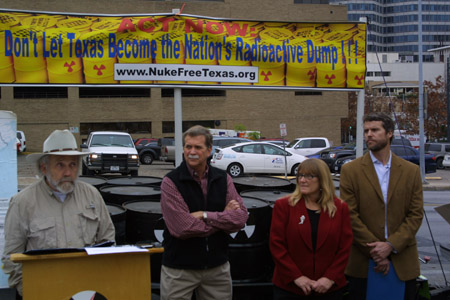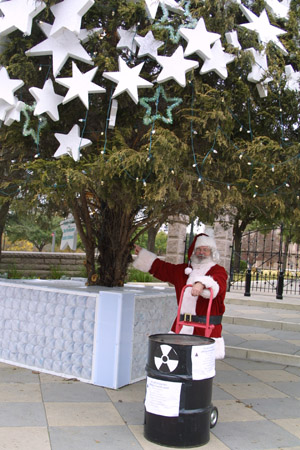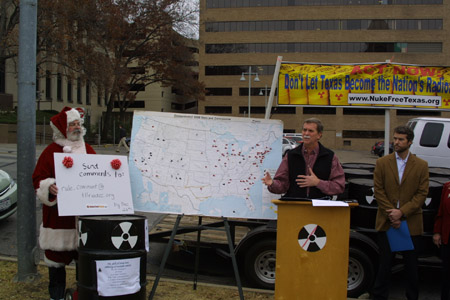Nuclear Waste From as Many as 36 States May Rumble Down Texas Highways if Texas Nuclear Waste Importation Plan Is Approved
Texans Have Until Sunday to Speak Against Radioactive Waste Rolling Along Highways and Rails
For Immediate Release:
Dec. 23, 2010
Contact:
Tom "Smitty" Smith (512) 477-1155
Trevor Lovell (512) 470-6572
Karen Hadden 512-797-8451
Download this release in pdf format for printing.

AUSTIN – Standing in front of a trailer full of black waste barrels representing radioactive waste, Public Citizen and the Sustainable Energy and Economic Development (SEED) Coalition today detailed a slew of problems associated with a plan to ship radioactive waste from 36 states into Texas.
"Texas radioactive waste commissioners are considering new rules that could allow Texas to become the nation’s radioactive waste dumping ground. The volume of waste transported, imported and stored could go up as much as 19 times," said Tom "Smitty" Smith, director of Public Citizen’s Texas office. "Our state law was designed to protect us from taking waste from many states. However, if these rules are changed, generators from all over the country can petition to send their waste to Texas if the commissioners approve the importation. Texans could get stuck paying billions to clean up the mess left behind."
The event was designed to raise awareness about the dangers of hauling so much radioactive waste through Texas towns by truck and rail. While routes are not yet designated, potential routes would take waste from the Gulf Coast area on Interstate 10 through Houston and San Antonio; waste from southern states would be trucked on I-20 and I-30 though Dallas and Forth Worth; Midwestern and Northeastern waste would be driven on I-40 and I-27 though Lubbock and Amarillo; and waste from Western states would be driven though the cities of El Paso and Odessa taking I-10 and I-20, according to Martin Resnikoff of Radioactive Waste Management Associates.
On Aug. 24, 2001, it was revealed that a 22-ton shipment of waste from an Illinois gaseous diffusion plant headed for Andrews, Texas, was lost for nearly a month. It was later found dumped on a North Texas cattle ranch near Oklahoma, piled on plastic and covered with dirt.
"Truck crashes occur all the time on our highways," Smith said. "This plan would dramatically increase the amount of radioactive waste traveling through our communities. We believe that if people know what is at stake, they will contact state officials and demand that the compact commission drop the proposal."

Nuclear Regulatory Commission (NRC) rules provide that class "A" wastes can be shipped in so-called "strong tight containers," barrels that do not have to pass any integrity test. About 10 percent of these containers that have been involved in accidents have failed. Of those, about 90 percent have released their contents, according to the NRC.
Under a 2003 agreement, a dump in Andrews County was designated to take radioactive waste from just Texas and Vermont. Now, the Texas Low Level Radioactive Waste Disposal Compact Commission is proposing to allow the importation of low-level radioactive waste from 36 states that don’t have anywhere to ship it.
The proposed dump would be operated by Waste Control Specialists (WCS), which is owned by Simmons, a politically powerful Republican who helped bankroll the Swift Boat attacks on Sen. John Kerry and who, according to Texans for Public Justice, has given Texas Gov. Rick Perry $1.12 million over the past decade, including $500,000 in 2010, making Simmons the No. 2 all-time individual donor to the governor.
The commission proposed rules earlier this year for such an expansion but withdrew them after receiving more than 3,000 comments from the public, most of them adamantly opposed to importation. On Nov. 3, the morning after the elections, the commission announced the rules would be re-posted with only minor changes. Citizens have until Sunday to submit comments.
"This looks like a Christmas present for a major donor," said Karen Hadden, director of the SEED Coalition. "Would Waste Control Specialists be able to expand so greatly if its owner wasn’t so politically connected? We suspect not."
"This is a blatant attempt to get these rules through while the public is busy with the holidays," Hadden added. "The commission should postpone these rules until both the Texas and Vermont legislatures – and the incoming Vermont governor – can consider the matter. Building a national nuclear waste dump in Texas violates the intent of the original Texas-Vermont agreement, which would limit the waste and raises a host of serious safety concerns that lawmakers need to consider."

A primary concern for the Texas Legislature would be the state’s liability for the waste. Under state law, once the waste is accepted for disposal, the taxpayers – not WCS – are liable for any spills, seepage into the groundwater or other contamination. This could easily result in millions or even billions of dollars in liability for Texans – far more than the $136 million dollar bond posted by WCS for such problems. For example, the Western New York Nuclear Service Center in West Valley, N.Y., could cost $9.9 billion or more to clean up, according to an analysis by Synapse Energy.
The staff who reviewed the permit at the Texas Commission on Environmental Quality (TCEQ) unanimously recommended against granting a license for a low-level radioactive waste dump. In an interoffice memo, TCEQ technical staff said that it was "highly likely" that radioactive waste would leak into groundwater. Several quit in protest when their recommendations went unheeded by then-Executive Director Glenn Shankle and the facility was licensed anyway. Shankle went on to work for Simmons as a lobbyist, representing WCS just six months after leaving the TCEQ.
Risks of groundwater contamination are a significant concern. Maps have been in flux while a hot debate centers on whether the WCS site is connected to the Ogallala, a huge aquifer that provides drinking water for nearly two million people and extends beneath eight states, also supplying water for more than a quarter of the country’s irrigated land.
"People have to understand that this is their last shot to block a national radioactive waste dump from being built in Texas, with all the dangers that come with that," Smith said. "We urge Texans to send comments and ask the commission to push the pause button on this proposal until such time as the legislature has a chance to look at the risks from an accident or from a leak. This proposal is being railroaded through the process before the fiscally conservative Texas Legislature recognizes what a giveaway this is."
Instructions and suggestions for comments are available at http://www.TexasNuclearSafety.org .
All photos courtesy of Andy Wilson.
###
Public Citizen is a national, nonprofit consumer advocacy organization based in Washington, D.C., with an office in Austin, Texas.
The Sustainable Energy and Economic Development Coalition is working for Clean Air and Clean Energy in Texas


